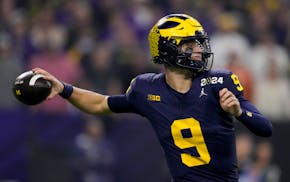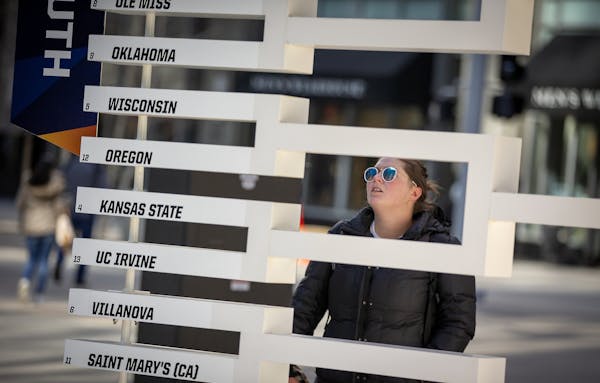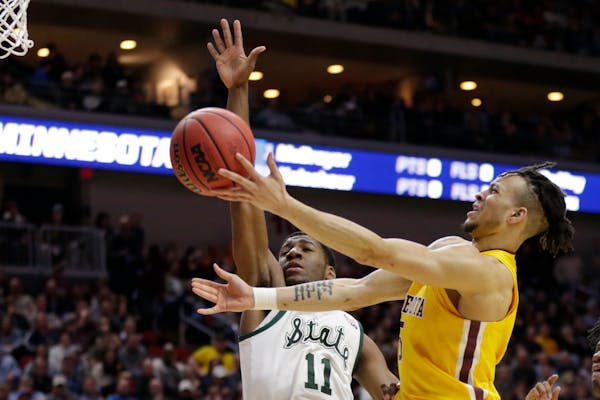DES MOINES – Jordan Murphy covered his face as he hugged his coach and teammates, knowing he would never share this kind of stage again.
Gophers coach Richard Pitino lamented the injuries that left him helpless against a traditional power.
Michigan State coach Tom Izzo, having a won a game he was all but certain to win, walked into the locker room like Caesar returning from conquests, and was enveloped by players, even the one he so aggressively berated.
"There's nothing like playing when it stays daylight longer," Izzo said, grinning dreamily. "You come out of practice now and the sun's still shining; it's the greatest feeling in the world."
The NCAA tournament isn't always entertaining. The occasional upset obscures the many blowouts, and the many games that are poorly played.
The skill level of the players is nothing close to the skill displayed in the NBA playoffs. Most games feature little-known players who will not succeed in pro basketball, if they even are chosen to play at that level.
So why does March Madness become the most frenetic, endearing, heart-stopping, gut-wrenching sporting event of this and every year?
There is the obvious explanation — that filling out a bracket commits everyone to caring. Yes, gambling, even for pennies or cans of pop, immediately raises the interest level in any sport.
But it's more than that. For those who spent a few days in Des Moines this week, you saw, in a handful of early-round tournament games, all of the emotions that make sports matter.
Pitino's elation as his team beat Louisville. His players' tears when they lost to Michigan State. Izzo's rage and elation.
Athletes and coaches believe in process, often to a fault. Try to get a pro baseball, football, hockey or basketball player to cry after a loss. They'll tell you that there's always tomorrow, or the next game, or the next season.
It's different in the NCAA tournament. Seniors graduate, stars leave for the NBA, and every player knows that she or he will get at most four cracks at winning a championship, or even a game.
There is a sense of finality and immediacy that often is absent on other grand sporting stages, and that finality and immediacy is heightened by the nature of the sport.
Nobody's wearing a facemask. Every player is on display a few feet from the crowd, and a few feet from anyone watching on a high-definition TV.
Murphy was a great college basketball player. He won one NCAA tournament game, during which he injured his back.
Fellow senior starter Dupree McBrayer will never again play on a stage like this.
College basketball is a flawed sport run by an awful organization. The kids save the sport and make March Madness the must-watch tournament it is.
Izzo got it right. The NCAA tournament takes center stage as spring springs, as we should all be taking to the parks and golf courses, replenishing our vitamin D and reuniting with nature.
But we can't. We can't walk away while that magician from Murray State introduces himself to the nation, or Zion becomes the next one-name player, or a freshman from Minnesota lights up Louisville.
Dylan Thomas wrote, "Rage, rage, against the dying of the light," but Izzo offered poetry that better fits basketball. When it's tourney time, spring can wait.
Jim Souhan's podcast can be heard at TalkNorth.com. On Twitter: @SouhanStrib. • jsouhan@startribune.com

Souhan: Wolves fans made Game 1 special. Now bring on Game 2.

Souhan: Should Vikings even consider McCarthy in NFL draft?

Souhan: NAW erases Suns' lead, Game 1 advantage with big performance

Souhan: This is KAT's chance to prove Flip Saunders was right



